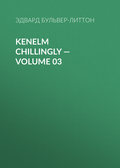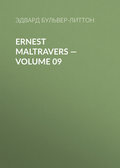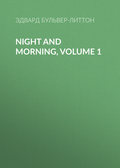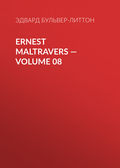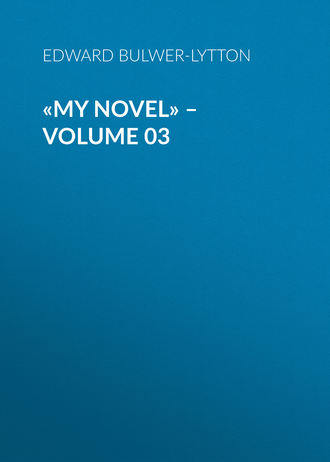
Эдвард Бульвер-Литтон
«My Novel» – Volume 03
CHAPTER XVIL
Dr. Riccabocca had secured Lenny Fairfield, and might therefore be considered to have ridden his hobby in the great whirligig with adroitness and success. But Miss Jemima was still driving round in her car, handling the reins, and flourishing the whip, without apparently having got an inch nearer to the flying form of Dr. Riccabocca.
Indeed, that excellent and only too susceptible spinster, with all her experience of the villany of man, had never conceived the wretch to be so thoroughly beyond the reach of redemption as when Dr. Riccabocca took his leave, and once more interred himself amidst the solitudes of the Casino, and without having made any formal renunciation of his criminal celibacy. For some days she shut herself up in her own chamber, and brooded with more than her usual gloomy satisfaction on the certainty of the approaching crash. Indeed, many signs of that universal calamity, which, while the visit of Riccabocca lasted, she had permitted herself to consider ambiguous, now became luminously apparent. Even the newspaper, which during that credulous and happy period had given half a column to Births and Marriages, now bore an ominously long catalogue of Deaths; so that it seemed as if the whole population had lost heart, and had no chance of repairing its daily losses. The leading article spoke, with the obscurity of a Pythian, of an impending CRISIS. Monstrous turnips sprouted out from the paragraphs devoted to General News. Cows bore calves with two heads, whales were stranded in the Humber, showers of frogs descended in the High Street of Cheltenham.
All these symptoms of the world's decrepitude and consummation, which by the side of the fascinating Riccabocca might admit of some doubt as to their origin and cause, now, conjoined with the worst of all, namely, the frightfully progressive wickedness of man,—left to Miss Jemima no ray of hope save that afforded by the reflection that she could contemplate the wreck of matter without a single sentiment of regret.
Mrs. Dale, however, by no means shared the despondency of her fair friend, and having gained access to Miss Jemima's chamber, succeeded, though not without difficulty, in her kindly attempts to cheer the drooping spirits of that female misanthropist. Nor, in her benevolent desire to speed the car of Miss Jemima to its hymeneal goal, was Mrs. Dale so cruel towards her male friend, Dr. Riccabocca, as she seemed to her husband. For Mrs. Dale was a woman of shrewdness and penetration, as most quick-tempered women are; and she knew that Miss Jemima was one of those excellent young ladies who are likely to value a husband in proportion to the difficulty of obtaining him. In fact, my readers of both sexes must often have met, in the course of their experience, with that peculiar sort of feminine disposition, which requires the warmth of the conjugal hearth to develop all its native good qualities; nor is it to be blamed overmuch if, innocently aware of this tendency in its nature, it turns towards what is best fitted for its growth and improvement, by laws akin to those which make the sunflower turn to the sun, or the willow to the stream. Ladies of this disposition, permanently thwarted in their affectionate bias, gradually languish away into intellectual inanition, or sprout out into those abnormal eccentricities which are classed under the general name of "oddity" or "character." But once admitted to their proper soil, it is astonishing what healthful improvement takes place,—how the poor heart, before starved and stinted of nourishment, throws out its suckers, and bursts into bloom and fruit. And thus many a belle from whom the beaux have stood aloof, only because the puppies think she could be had for the asking, they see afterwards settled down into true wife and fond mother, with amaze at their former disparagement, and a sigh at their blind hardness of heart.
In all probability Mrs. Dale took this view of the subject; and certainly, in addition to all the hitherto dormant virtues which would be awakened in Miss Jemima when fairly Mrs. Riccabocca, she counted somewhat upon the mere worldly advantage which such a match would bestow upon the exile. So respectable a connection with one of the oldest, wealthiest, and most popular families in the shire would in itself give him a position not to be despised by a poor stranger in the land; and though the interest of Miss Jemima's dowry might not be much, regarded in the light of English pounds (not Milanese lire), still it would suffice to prevent that gradual process of dematerialization which the lengthened diet upon minnows and sticklebacks had already made apparent in the fine and slow-evanishing form of the philosopher.
Like all persons convinced of the expediency of a thing, Mrs. Dale saw nothing wanting but opportunities to insure its success. And that these might be forthcoming she not only renewed with greater frequency, and more urgent instance than ever, her friendly invitations to Riccabocca to drink tea and spend the evening, but she so artfully chafed the squire on his sore point of hospitality, that the doctor received weekly a pressing solicitation to dine and sleep at the Hall.
At first the Italian pished and grunted, and said /Cospetto/, and /Per Bacco/, and /Diavolo/, and tried to creep out of so much proffered courtesy. But like all single gentlemen, he was a little under the tyrannical influence of his faithful servant; and Jackeymo, though he could bear starving as well as his master when necessary, still, when he had the option, preferred roast beef and plum-pudding. Moreover, that vain and incautious confidence of Riccabocca touching the vast sum at his command, and with no heavier drawback than that of so amiable a lady as Miss Jemima—who had already shown him (Jackeymo) many little delicate attentions—had greatly whetted the cupidity which was in the servant's Italian nature,—a cupidity the more keen because, long debarred its legitimate exercise on his own mercenary interests, he carried it all to the account of his master's!
Thus tempted by his enemy and betrayed by his servant, the unfortunate Riccabocca fell, though with eyes not unblinded, into the hospitable snares extended for the destruction of his—celibacy! He went often to the Parsonage, often to the Hall, and by degrees the sweets of the social domestic life, long denied him, began to exercise their enervating charm upon the stoicism of our poor exile. Frank had now returned to Eton. An unexpected invitation had carried off Captain Higginbotham to pass a few weeks at Bath with a distant relation, who had lately returned from India, and who, as rich as Creesus, felt so estranged and solitary in his native isle that, when the captain "claimed kindred there," to his own amaze "he had his claims allowed;" while a very protracted sitting of parliament still delayed in London the squire's habitual visitors during the later summer; so that—a chasm thus made in his society— Mr. Hazeldean welcomed with no hollow cordiality the diversion or distraction he found in the foreigner's companionship. Thus, with pleasure to all parties, and strong hopes to the two female conspirators, the intimacy between the Casino and Hall rapidly thickened; but still not a word resembling a distinct proposal did Dr. Riccabocca breathe. And still, if such an idea obtruded itself on his mind, it was chased therefrom with so determined a Diavolo that perhaps, if not the end of the world, at least the end of Miss Jemima's tenure in it, might have approached and seen her still Miss Jemima, but for a certain letter with a foreign postmark that reached the doctor one Tuesday morning.
CHAPTER XVIII
The servant saw that something had gone wrong, and, under pretence of syringing the orange-trees, he lingered near his master, and peered through the sunny leaves upon Riccabocca's melancholy brows.
The doctor sighed heavily. Nor did he, as was his wont after some such sigh, mechanically take up that dear comforter the pipe. But though the tobacco-pouch lay by his side on the balustrade, and the pipe stood against the wall between his knees, childlike lifting up its lips to the customary caress, he heeded neither the one nor the other, but laid the letter silently on his lap, and fixed his eyes upon the ground.
"It must be bad news indeed!" thought Jackeymo, and desisted from his work. Approaching his master, he took up the pipe and the tobacco-pouch, and filled the bowl slowly, glancing all the while towards that dark musing face on which, when abandoned by the expression of intellectual vivacity or the exquisite smile of Italian courtesy, the deep downward lines revealed the characters of sorrow. Jackeymo did not venture to speak; but the continued silence of his master disturbed him much. He laid that peculiar tinder which your smokers use upon the steel, and struck the spark,—still not a word, nor did Riccabocca stretch forth his hand.
"I never knew him in this taking before," thought Jackeymo; and delicately he insinuated the neck of the pipe into the nerveless fingers of the band that lay supine on those quiet knees. The pipe fell to the ground.
Jackeymo crossed himself, and began praying to his sainted namesake with great fervour.
The doctor rose slowly, and as if with effort; he walked once or twice to and fro the terrace; and then he halted abruptly and said,—
"Friend!"
"Blessed Monsignore San Giacomo, I knew thou wouldst hear me!" cried the servant; and he raised his master's hand to his lips, then abruptly turned away and wiped his eyes.
"Friend," repeated Riccabocca, and this time with a tremulous emphasis, and in the softest tone of a voice never wholly without the music of the sweet South, "I would talk to thee of my child."
CHAPTER XIX
"The letter, then, relates to the signorina. She is well?"
"Yes, she is well now. She is in our native Italy." Jackeymo raised his eyes involuntarily towards the orange-trees, and the morning breeze swept by and bore to him the odour of their blossoms.
"Those are sweet even here, with care," said he, pointing to the trees.
"I think I have said that before to the padrone."
But Riccabocca was now looking again at the letter, and did not notice either the gesture or the remark of his servant. "My aunt is no more!" said he, after a pause.
"We will pray for her soul!" answered Jackeymo, solemnly. "But she was very old, and had been a long time ailing. Let it not grieve the padrone too keenly: at that age, and with those infirmities, death comes as a friend."
"Peace be to her dust!" returned the Italian. "If she had her faults, be they now forgotten forever; and in the hour of my danger and distress she sheltered my infant! That shelter is destroyed. This letter is from the priest, her confessor. And the home of which my child is bereaved falls to the inheritance of my enemy."
"Traitor!" muttered Jackeymo; and his right hand seemed to feel for the weapon which the Italians of lower rank often openly wear in their girdles.
"The priest," resumed Riccabocca, calmly, "has rightly judged in removing my child as a guest from the house in which that traitor enters as lord."
"And where is the signorina?"
"With the poor priest. See, Giacomo, here, here—this is her handwriting at the end of the letter,—the first lines she ever yet traced to me."
Jackeymo took off his hat, and looked reverently on the large characters of a child's writing. But large as they were, they seemed indistinct, for the paper was blistered with the child's tears; and on the place where they had not fallen, there was a round fresh moist stain of the tear that had dropped from the lids of the father. Riccabocca renewed, "The priest recommends a convent."
"To the devil with the priest!" cried the servant; then crossing himself rapidly, he added, "I did not mean that, Monsignore San Giacomo,—forgive me! But your Excellency does not think of making a nun of his only child!"
[The title of Excellency does not, in Italian, necessarily express any exalted rank, but is often given by servants to their masters.]
"And yet why not?" said Riccabocca, mournfully; "what can I give her in the world? Is the land of the stranger a better refuge than the home of peace in her native clime?"
"In the land of the stranger beats her father's heart!"
"And if that beat were stilled, what then? Ill fares the life that a single death can bereave of all. In a convent at least (and the priest's influence can obtain her that asylum amongst her equals and amidst her sex) she is safe from trial and from penury—to her grave!"
"Penury! Just see how rich we shall be when we take those fields at Michaelmas."
"/Pazzie/!"—[Follies]—said Riccabocca, listlessly. "Are these suns more serene than ours, or the soil more fertile? Yet in our own Italy, saith the proverb, 'He who sows land reaps more care than corn.' It were different," continued the father, after a pause, and in a more resolute tone, "if I had some independence, however small, to count on,—nay, if among all my tribe of dainty relatives there were but one female who would accompany Violante to the exile's hearth,—Ishmael had his Hagar. But how can we two rough-bearded men provide for all the nameless wants and cares of a frail female child? And she has been so delicately reared,—the woman-child needs the fostering hand and tender eye of a woman."
"And with a word," said Jackeymo, resolutely, "the padrone might secure to his child all that he needs to save her from the sepulchre of a convent; and ere the autumn leaves fall, she might be sitting on his knee. Padrone, do not think that you can conceal from me the truth, that you love your child better than all things in the world,—now the Patria is as dead to you as the dust of your fathers,—and your heart-strings would crack with the effort to tear her from them, and consign her to a convent. Padrone, never again to hear her voice, never again to see her face! Those little arms that twined round your neck that dark night, when we fled fast for life and freedom, and you said, as you felt their clasp, 'Friend, all is not yet lost.'"
"Giacomo!" exclaimed the father, reproachfully, and his voice seemed to choke him. Riccabocca turned away, and walked restlessly to and fro the terrace; then, lifting his arms with a wild gesture, as he still continued his long irregular strides, he muttered, "Yes, Heaven is my witness that I could have borne reverse and banishment without a murmur, had I permitted myself that young partner in exile and privation. Heaven is my witness that, if I hesitate now, it is because I would not listen to my own selfish heart. Yet never, never to see her again,—my child! And it was but as the infant that I beheld her! O friend, friend!" (and, stopping short with a burst of uncontrollable emotion, he bowed his head upon his servant's shoulder), "thou knowest what I have endured and suffered at my hearth, as in my country; the wrong, the perfidy, the— the—" His voice again failed him; be clung to his servant's breast, and his whole frame shook.
"But your child, the innocent one—think now only of her!" faltered Giacomo, struggling with his own sobs. "True, only of her," replied the exile, raising his face, "only of her. Put aside thy thoughts for thyself, friend,—counsel me. If I were to send for Violante, and if, transplanted to these keen airs, she drooped and died—Look, look, the priest says that she needs such tender care; or if I myself were summoned from the world, to leave her in it alone, friendless, homeless, breadless perhaps, at the age of woman's sharpest trial against temptation, would she not live to mourn the cruel egotism that closed on her infant innocence the gates of the House of God?"
Jackeymo was appalled by this appeal; and indeed Riccabocca had never before thus reverently spoken of the cloister. In his hours of philosophy, he was wont to sneer at monks and nuns, priesthood and superstition. But now, in that hour of emotion, the Old Religion reclaimed her empire; and the sceptical world-wise man, thinking only of his child, spoke and felt with a child's simple faith.
CHAPTER XX
"But again I say," murmured Jackeymo, scarce audibly, and after a long silence, "if the padrone would make up his mind—to marry!"
He expected that his master would start up in his customary indignation at such a suggestion,—nay, he might not have been sorry so to have changed the current of feeling; but the poor Italian only winced slightly, and mildly withdrawing himself from his servant's supporting arm, again paced the terrace, but this time quietly and in silence. A quarter of an hour thus passed. "Give me the pipe," said Dr. Riccabocca, passing into the belvidere.
Jackeymo again struck the spark, and, wonderfully relieved at the padrone's return to the habitual adviser, mentally besought his sainted namesake to bestow a double portion of soothing wisdom on the benignant influences of the weed.
CHAPTER XXI
Dr. Riccabocca had been some little time in the solitude of the belvidere, when Lenny Fairfield, not knowing that his employer was therein, entered to lay down a book which the doctor had lent him, with injunctions to leave it on a certain table when done with. Riccabocca looked up at the sound of the young peasant's step.
"I beg your honour's pardon, I did not know—"
"Never mind: lay the book there. I wish to speak with you. You look well, my child: this air agrees with you as well as that of Hazeldean?"
"Oh, yes, Sir!"
"Yet it is higher ground,—more exposed?"
"That can hardly be, sir," said Lenny; "there are many plants grow here which don't flourish at the squire's. The hill yonder keeps off the east wind, and the place lays to the south."
"Lies, not lays, Lenny. What are the principal complaints in these parts?"
"Eh, sir?"
"I mean what maladies, what diseases?"
"I never heard tell of any, sir, except the rheumatism."
"No low fevers, no consumption?"
"Never heard of them, sir."
Riccabocca drew a long breath, as if relieved. "That seems a very kind family at the Hall."
"I have nothing to say against it," answered Lenny, bluntly. "I have not been treated justly. But as that book says, sir, 'It is not every one who comes into the world with a silver spoon in his mouth.'"
Little thought the doctor that those wise maxims may leave sore thoughts behind them! He was too occupied with the subject most at his own heart to think then of what was in Lenny Fairfield's.
"Yes; a kind, English domestic family. Did you see much of Miss Hazeldean?"
"Not so much as of the Lady."
"Is she liked in the village, think you?"
"Miss Jemima? Yes. She never did harm. Her little dog bit me once,– she did not ask me to beg its pardon, she asked mine! She's a very nice young lady; the girls say she is very affable; and," added Lenny, with a smile, "there are always more weddings going on when she is down at the Hall."
"Oh!" said Riccabocca. Then, after a long whiff, "Did you ever see her play with the little children? Is she fond of children, do you think?"
"Lord, sir, you guess everything! She's never so pleased as when she's playing with the babies."
"Humph!" grunted Riccabocca. "Babies! well, that's woman-like. I don't mean exactly babies, but when they're older,—little girls?"
"Indeed, Sir, I dare say; but," said Lenny, primly, "I never as yet kept company with the little girls."
"Quite right, Lenny; be equally discreet all your life. Mrs. Dale is very intimate with Miss Hazeldean,—more than with the squire's lady. Why is that, think you?"
"Well, sir," said Leonard, shrewdly, "Mrs. Dale has her little tempers, though she's a very good lady; and Madame Hazeldean is rather high, and has a spirit. But Miss Jemima is so soft: any one could live with Miss Jemima, as Joe and the servants say at the Hall."
"Indeed! get my hat out of the parlour, and—just bring a clothes-brush, Lenny. A fine sunny day for a walk."
After this most mean and dishonourable inquisition into the character and popular repute of Miss Hazeldean, Signor Riccabocca seemed as much cheered up and elated as if he had committed some very noble action; and he walked forth in the direction of the Hall with a far lighter and livelier step than that with which he had paced the terrace.
"Monsignore San Giacomo, by thy help and the pipe's, the padrone shall have his child!" muttered the servant, looking up from the garden.




